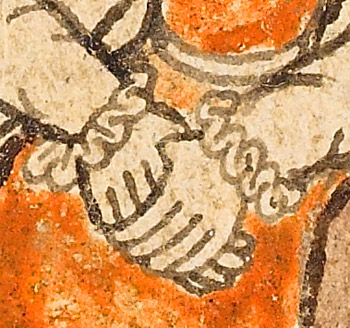Duke Roland and Sir Otuel of Spain
General Information
Plot Summary

Otuel, a Saracen knight, arrives at Charlemagne’s court in Paris with a message from his uncle, Emperor Garcy. As he boasts of Garcy’s successes in Lombardy, Otuel is attacked by a French knight, whom he quickly kills. Charlemagne protects him from the angry Barons and he delivers his message: Charlemagne must surrender France and abandon Christianity. The French angrily refuse and, when Otuel mocks Duke Naymes, he and Roland agree to fight a duel.
The following morning, Roland is armed by the peers, while Charlemagne’s daughter Belisant and her maidens tend to Otuel. As Charlemagne looks on, the two fight fiercely: evenly matched, they slay one-another’s horses and break each other’s armour. Otuel scornfully refuses Roland’s pleas to adopt Christianity and join the French, but when, in answer to Charlemagne’s prayers, the Holy Spirit settles on his helmet in the form of a dove, he submits and converts. He is baptised by Bishop Turpin and accepts Charlemagne’s offer of Belisant, though he delays their wedding until Garcy is defeated.
That spring, Charlemagne assembles a huge army and travels to Lombardy to attack Garcy. As the troops rest after their voyage, Roland, Oliver and Ogier secretly leave the camp in search of adventure. They skirmish with four Saracen kings, slaying three and taking the fourth, Clarel, prisoner. As they depart, however, the three knights encounter a thousand Saracens: on Ogier’s suggestion they release their prisoner before entering battle. They fight bravely, slaying many Saracens, and when Ogier is overpowered and taken, Clarel sends him to his lover to be healed. Meanwhile, Saracen reinforcements arrive and Roland and Oliver retreat. As they do so, however, they meet Otuel, who has noticed their absence and is searching for them with seven hundred men. He rebukes their foolhardyness but joins the fray, killing many Saracens before Clarel drives the French back. As he does so, he encounters Otuel, who reveals his identity and refuses to retract his conversion. The pair agree to fight a duel the following day and the combatants return to their camps.
The next morning, Clarel arms himself and enters the French camp with one hundred knights carrying idols. He curses Charlemagne, who threatens to fight him himself, but Otuel insists that the duel is his, and is armed by the peers and blessed by Turpin. Insulting each other’s gods, the pair grapple fiercely until Otuell slays Clarel. An enraged Emperor Garcy vows vengeance on the Christians and marshals his armies: after some individual skirmishes in which Roland is wounded, a general battle begins.
The French inflict great damage on the Saracen army, and although they are driven back at one point, they rally and gain the upper hand. Garcy recognises Otuel and laments his defection, but the French continue to resist his attacks. When Ogier escapes from Clarel’s prison and joins Charlemagne, his prowess finally causes Garcy to flee. Otuel pursues and captures his uncle, and the victorious French return to Paris, where he finally marries Belisaunt and joins the Peers.
From: S. J. Hertage, ed. The English Charlemagne Romances Part II. EETS es. 35.
Manuscript: London, British Library, Additional 31042.
Manuscripts
Click a title below to search for all romances in that manuscript.